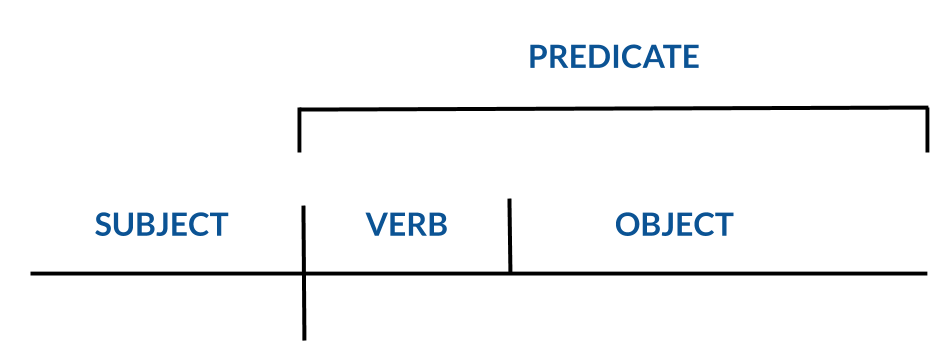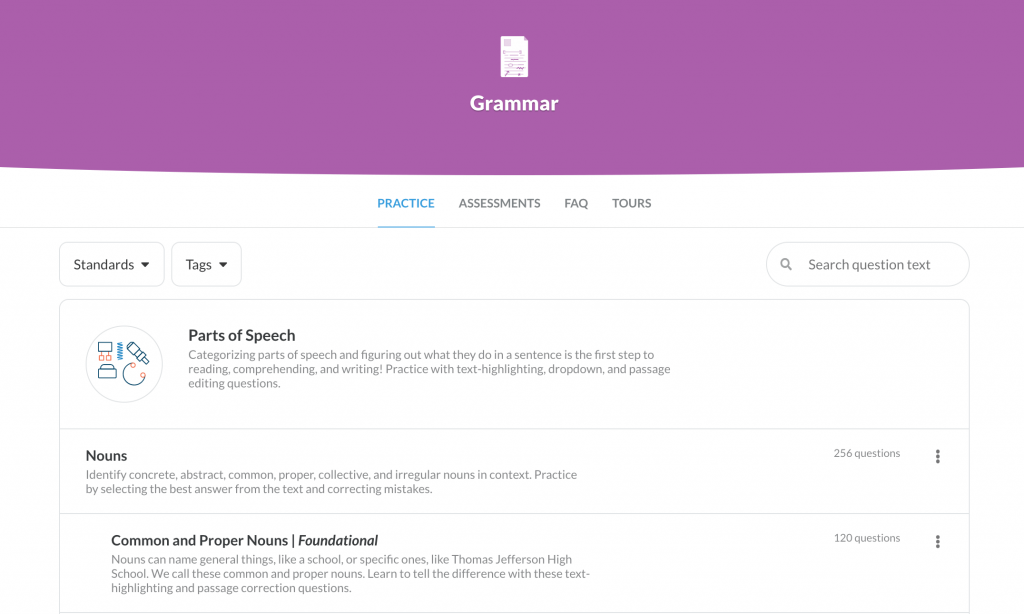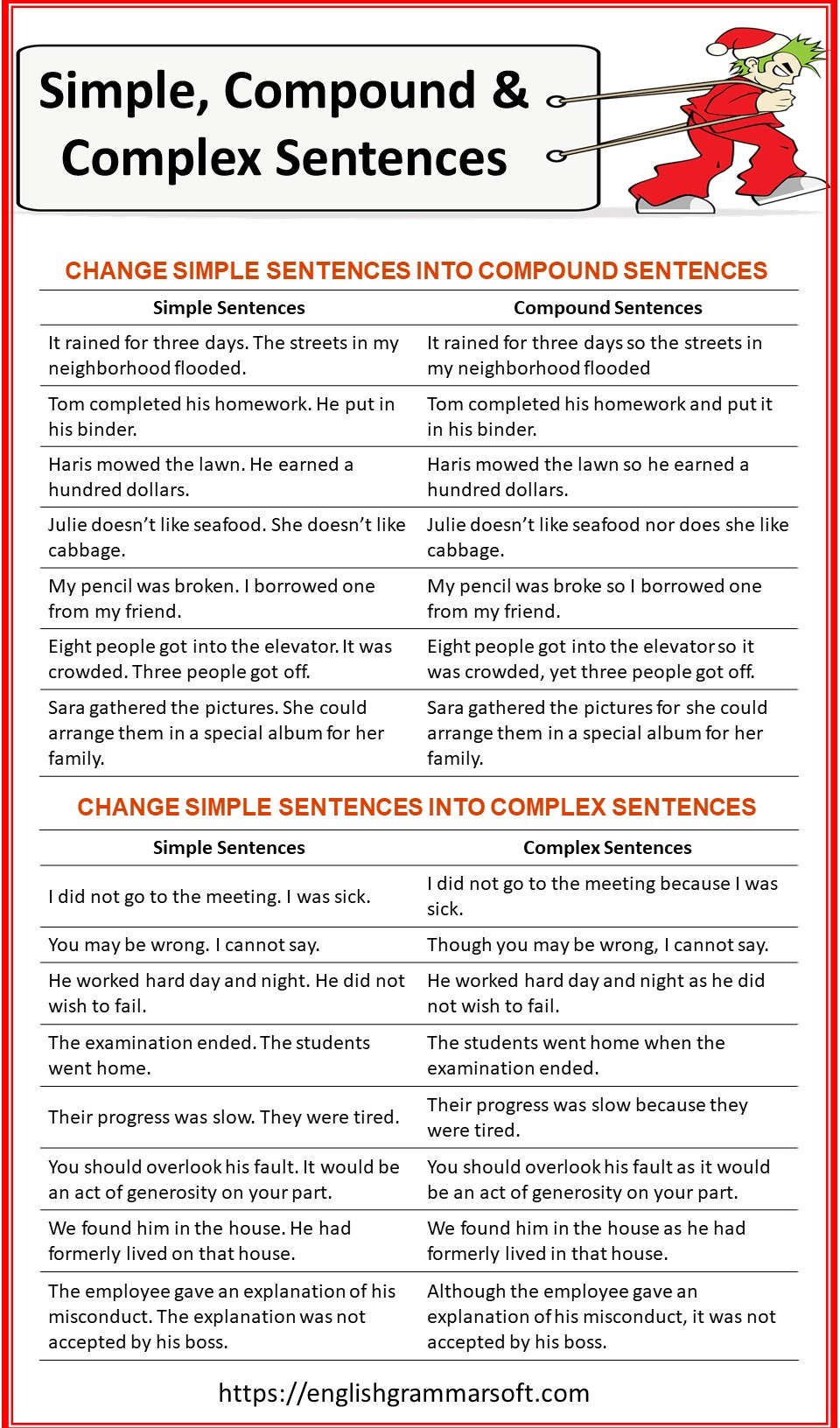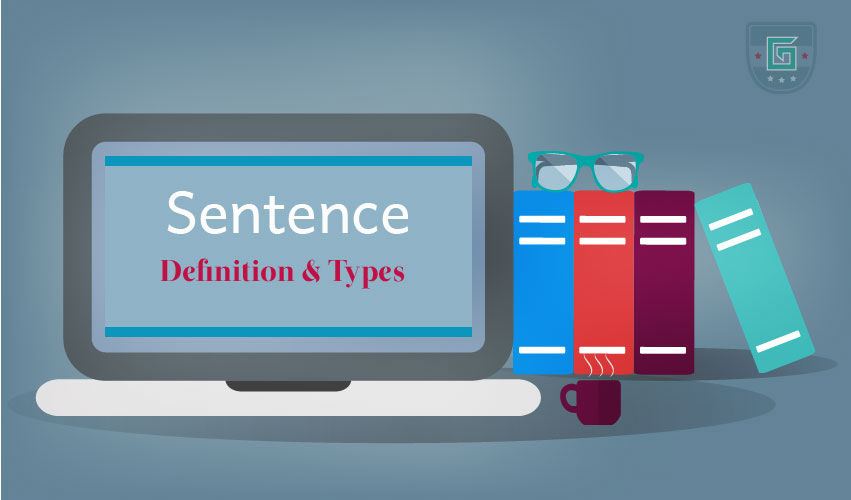Do you remember the first time you learned how to write a sentence? Most of us are taught how to put three words together to make sentences in kindergarten: I like dogs. She eats cookies. Games are fun! Sound familiar? These three-word sentences are one of the most basic types of simple sentences, and they serve as a foundation to forming more complex sentences. However, simple sentences are not always as simple as three-word sentences.
In this post we’ll review what simple sentences are, the parts of a simple sentence, and different ways to create simple sentences.
Once you’re feeling confident, test yourself with a post-assessment quiz and practice with our high quality, standards-aligned questions here.
The Basics of Simple Sentences

What are Simple Sentences?
A simple sentence is a sentence containing only one clause, or more specifically, an independent clause, with a subject and a predicate.
A simple sentence is typically made up of a subject, verb, and object, or SVO, and creates a complete thought; however, since a simple predicate is a verb or verb phrase only, a simple sentence can also be made up of only a subject and verb (SV).

Subject + Verb + Object (SVO)
- Jessie ate dinner.
Subject + Verb (SV)
- Jessie ate.
Both of these examples are grammatically correct simple sentences, but including an object helps to clarify the full idea of the sentence.
Despite their name, simple sentences can include things that are not so simple. Let’s review the use of modifiers, compound subjects, and compound verbs/predicates in simple sentences.
Modifiers in Simple Sentences

Modifiers are words or phrases that can be included in simple sentences to add more detail. Let’s see how we can modify the simple sentence used above:
- Jessie ate dinner.
Adding Articles/Adjectives
- The hungry Jessie ate a large dinner.
Adding Adverbs
- The hungry Jessie quickly ate a very large dinner.
Adding a Prepositional Phrase
- The hungry Jessie quickly ate a very large dinner after a long day at work.
All of these examples still qualify as simple sentences, because they are all independent clauses that convey a complete thought.
Pro Tip: Ask yourself how the sentence is changed as a result of a modifier.
Compound Subjects in Simple Sentences
Compound subjects are two or more nouns or pronouns sharing the same verb. They are joined using coordinate or correlative conjunctions.
Compound Subjects Using Coordinate Conjunctions
- Jessie and Jade ate dinner.
- Jessie or Jade ate dinner.
- Jessie, Jade, and Titus ate dinner.
Compound Subjects Using Correlative Conjunctions
- Both Jessie and Jade ate dinner.
- Neither Jessie nor Jade ate dinner.
Even with two or more simple subjects, these examples are independent clauses conveying a complete thought, so they are still simple sentences.
Compound Verbs/Predicates in Simple Sentences

Compound verbs, or compound predicates, are two or more verbs/predicates that share the same subject. This may be written as simply as a subject performing multiple verbs (simple predicates) or, more elaborately, as a subject performing multiple complete predicates. The compound verbs/predicates are joined by a conjunction.
Compound Verbs/Simple Predicates
- Jessie cooked and ate dinner.
- Jessie rinsed and washed the dishes.
Compound Predicates
- Jessie ate dinner and washed the dishes.
- Jessie cooked dinner and rinsed the dishes
Again, these examples are all independent clauses conveying a complete thought. So even with multiple verbs, a sentence can be a simple sentence.
Return to the Table of Contents
Tips for Using and Identifying Simple Sentences
Tip #1: Subject + Verb + Object (SVO) Simple Sentences Can be Arranged in Different Ways.
While a simple sentence is typically expected to contain a subject, verb, and object, this does not always mean that the subject will be the first thing we see in a sentence. When we place parts of the predicate at the beginning of the sentence or ask a question, the standard SVO arrangement of a simple sentence will vary.
Placing a Part of the Predicate Before the Subject
When the predicate, or verb + object portion of the sentence contains a prepositional phrase or adverb, they can appear at the beginning of the sentence followed by a comma. Check out the following examples to see sentences in both their standard forms and rearranged forms:
Prepositional Phrase:
- We completed our homework after school.
- After school, we completed our homework.
Adverb:
- I ran quickly to the store.
- Quickly, I ran to the store.
Asking a Question
Sentences that ask a question are called interrogative sentences, and they are often simple sentences. Some questions start with the main verb or part of the verb phrase. Look at the examples below to see the placement of the verb in both a question and the statement form of the question:
- Will it rain tomorrow?
- It will rain tomorrow.
- Has the race been postponed?
- The race has been postponed.
- Were you sick today?
- You were sick today.
Tip #2: Avoid using too many basic simple sentences in your writing.
Remember, basic simple sentences are the first type of sentence we learn how to write. So it’s probably safe to assume that filling our writing with three or four word sentences is not the best idea. Too many simple sentences close together can sound choppy and disconnected. Always revise your work to see where simple sentences can be edited to create more sophisticated writing.
Combine Simple Sentences
If you have a string of very basic simple sentences in your writing, you can probably combine some of those sentences into compound sentences.
Choppy:
- He loves baseball. He first played little league baseball. He joined the baseball team in middle school.
Revised:
- He loves baseball and played little league before joining the baseball team in middle school.
Tip #3: Add more detail.
There’s nothing wrong with using simple sentences in your writing, but you can (and should) use modifiers to enhance simple sentences when possible.
Basic Simple Sentence:
- I visited Chichén Itzá.
Revised:
- On my vacation to Mexico, I visited the ancient Mayan ruins of Chichén Itzá.
Return to the Table of Contents
Applying the Basics: Simple Sentences Review & Practice
Now that you understand what simple sentences are, and how to use them properly in your writing, let’s practice identifying them. Remember, a simple sentence is a sentence that contains one independent clause, or one complete thought.
Simple Sentences Exercises & Review
Complete the quick exercise below to assess your mastery of simple sentences.
Determine if the sentence is a simple sentence or not.
1. I finally received my passport for our trip overseas.
- Simple Sentence
2. Last week, she told the funniest joke in the middle of the meeting.
- Simple Sentence
3. Tim went to the store, and he bought a new laptop for school.
- Not a Simple Sentence
4. Julie and Paige went to the amusement park and rode a rollercoaster.
- Simple Sentence
5. I was exhausted after working all day.
- Not a Simple Sentence
For additional practice, check out the Simple Sentences content on Albert.
Return to the Table of Contents
Try for Yourself: Simple Sentences Quiz

Feeling confident in your understanding of Simple Sentences?
Take this short quiz to see what you’ve learned:
1. Can a simple sentence have more than one subject?
- Answer: Yes
- Correct Explanation: That’s right! A simple sentence can have more than one subject, or a compound subject, if they are sharing the same verb. The subjects are joined using coordinate or correlative conjunctions.
- Incorrect Explanation: Sorry, that’s not right. A simple sentence can have more than one subject, or a compound subject, if they are sharing the same verb. The subjects are joined using coordinate or correlative conjunctions.
2. Can a simple sentence be a single dependent clause?
- Answer: No
- Correct Explanation: That’s right! A simple sentence must be a single independent clause in order to be a simple sentence. It is a complete thought and can stand alone. A dependent clause cannot stand alone as a complete thought.
- Incorrect Explanation: Sorry, that’s not right. A dependent clause cannot stand alone as a complete thought. A simple sentence must be a single independent clause in order to be a simple sentence. It is a complete thought and can stand alone.
3. Can a simple sentence have more than one verb?
- Answer: Yes
- Correct Explanation: That’s right! A simple sentence can have more than one verb (compound verb/simple predicate) or more than one complete predicate (compound predicate) if they share the same subject. They are combined using a conjunction.
- Incorrect Explanation: Sorry, that’s not right. A simple sentence can have more than one verb (compound verb/simple predicate) or more than one complete predicate (compound predicate) if they share the same subject. They are combined using a conjunction.
4. Does a simple sentence always start with the subject?
- Answer: No
- Correct Explanation: That’s right! A simple sentence can start with part of the predicate. This might be a prepositional phrase, and adverb, or a question.
- Incorrect Explanation: Sorry, that’s not right. A simple sentence can start with part of the predicate. This might be a prepositional phrase, and adverb, or a question.
5. Is the following example a simple sentence?
After eating breakfast, Hayley went to dance practice, and she prepared for her performance.
- Answer: No
- Correct Explanation: That’s right! A simple sentence can have more than one predicate when that predicate shares the same subject. In this sentence, there are two independent clauses: After eating breakfast, Hayley went to dance practice. She prepared for her performance.
- Incorrect Explanation: Sorry, that’s not right. A simple sentence can have more than one predicate when that predicate shares the same subject. In this sentence, there are two independent clauses: After eating breakfast, Hayley went to dance practice. She prepared for her performance.
6. Is the following example a simple sentence?
Jim and Amy thoroughly cleared out the basement and hired contractors for a remodel.
- Answer: Yes
- Correct Explanation: That’s right! A simple sentence can have compound subjects and compound predicates as long as they form one complete thought. The subjects share the predicates, and the predicates share the subjects. In this case, the compound subject “Jim and Amy” share the compound predicates “thoroughly cleared out the basement” and “hired contractors for a remodel.”
- Incorrect Explanation: Sorry, that’s not right. A simple sentence can have compound subjects and compound predicates as long as they form one complete thought. The subjects share the predicates, and the predicates share the subjects. In this case, the compound subject “Jim and Amy” share the compound predicates “thoroughly cleared out the basement” and “hired contractors for a remodel.”
For additional practice with simple sentences, check out our completely free practice on Albert.io: Simple Sentences.
Return to the Table of Contents
Teacher’s Corner for Simple Sentences
While it’s true that simple sentences are a foundational grammar skill, the Common Core English Language Progressive Skills Chart shows that even elementary-level skills “require continued attention in higher grades as they are applied to increasingly sophisticated writing and speaking.”
For specific standards addressing simple sentences, check out the Common Core State Standards site!
Albert’s grammar course is 100% free, and the Simple Sentences practices can be used for much more than homework!
Our assessments can be used as pre-and post-tests to measure student progress. Our pre-made quizzes can be used as bell-ringers, exit tickets, and more!
In addition to our pre-made assessments, you can also use our assignments feature to create your own quizzes and assessments.
Summary on Simple Sentences
Simple sentences are sentences containing one independent clause, with a subject and a predicate.
Modifiers, compound subjects, and compound verbs/predicates can be used in simple sentences.
The standard arrangement of a simple sentence is subject + verb + object, or SVO order. This can vary by arranging parts of the predicate before the subject.
Practice makes perfect! Use our Simple Sentences practice on Albert’s completely free grammar course!
Need help preparing for your Grammar exam?

Albert has hundreds of grammar practice questions with detailed explanations to help you master concepts.
Three word expressions are common in English. Practising them and using them when you speak will help you sound more natural.
Here are ten common English expressions, along with an explanation and example sentence.
Black and white
Dos and don’ts
Haves and have nots
Ins and outs
Kiss and tell
Odds and ends
P’s and Q’s
Pros and cons
Rights and wrongs
Tried and tested
black and white = something which is extremely clear: “He told her in black and white that she couldn’t leave the house while he was out.”
dos and don’ts = the rules: “There are various do’s and don’ts about driving in the UK.”
haves and have nots = people who are rich and those who are not: “In London you can find the haves and have nots of the population.”
ins and outs = the details: “I don’t know the ins and outs of the situation, so I can’t really advise you.”
kiss and tell = when someone sells a story of themselves and a famous person: “The British tabloids are famous for publishing kiss and tell stories.”
odds and ends = small pieces of various items: “She made a stew with the odds and ends she found in the fridge.”
P’s and Q’s = manners (such as please and thank you): “Mind your P’s and Q’s when you visit them!”
pros and cons = advantages and disadvantages: “There are a few pros and cons that we should consider before buying a new house.”
rights and wrongs = all the good points and bad points of a situation: “Regardless of the rights and wrongs of company policy, you need to give a month’s notice.”
tried and tested = something which has been well tested: “Using salt is a tried and tested way of getting red wine out of a carpet.”
Here are ten more expressions:
Ups and downs
Come and go
Back and forth
Dribs and drabs
Said and done
Cat and mouse
Trial and error
Flesh and blood
Down and out
By and large
ups and downs = very good times and very bad times: “They have a lot of ups and downs in their relationship.”
come and go = use somewhere as your base: “Feel free to come and go as you please!”
back and forth = not to stay still, but to keep travelling between two places: “I’m so glad I’m moving. I was getting sick of going back and forth every day. Now my journey to work will be a lot quicker.”
dribs and drabs = not a steady amount of something: “The marathon runners finished in dribs and drabs.”
said and done = to have the final word on something: “When it’s all said and done, the new reception area is going to be a credit to the company.”
cat and mouse = doing something in the same way that a cat plays with a mouse: “The guerillas played a cat and mouse game with the much better-equipped army.”
trial and error = to do something new by making experiments and occasionally failing: “The new computer system has been installed. But it’s a bit trial and error at the moment – nobody really knows how to use it.”
flesh and blood = your family: “I have to help him if I can – he’s my flesh and blood.”
down and out = someone who has no money at all who has to live on the street: “There are too many young down and outs in London.”
by and large = generally: “By and large, our customers prefer good service to low prices.”
And a further ten expressions:
Up and running = in operation: “The new company is now up and running.”
Noughts and crosses = a game where you take it in turns to put your symbol (either a nought or a cross) into one of nine spaces. The idea is to have a row of either three noughts or three crosses, but your opponent tries to block you. The game looks like this:
O X O
X O X
X O X
Bring and buy = a fair where people try to raise money for a cause by bringing something that other people might want to buy: “I’m making a cake for the school’s bring and buy next week.”
Hide and seek = a children’s game where one child hides and the others try to find him / her: “Someone’s been playing hide and seek with the TV remote control again!”
Around and about = a vague phrase to avoid saying where you have been exactly: “Where have you been – I’ve been worried!”
“Oh, around and about, you know.”
To and fro = another way of saying “back and forth”: “I’m exhausted – I’ve been going to and fro all week!”
Over and out = something you say to show you have come to the end of your message: “The last thing they heard from the pilot was ‘over and out’.”
Done and dusted = properly finished: “Well, that’s this project done and dusted. We need a holiday now.”
Dead and buried = something that will not happen: “That idea is now dead and buried – the Executive Committee decided some time ago to go with another proposal.”
Wine and dine = to entertain someone lavishly: “He’s well-known for wining and dining his business partners.”
Bread and butter = your main source of income, or the most important issue: “Health and education are the bread and butter issues facing the UK government.”
Spick and span = very tidy and clean: “Her house is spick and span at all times.”
Wheel and deal = to make deals when buying and selling things: “If you need a new car, try speaking to John. He’s a bit of a wheeler and dealer!”
A sentence is the largest unit of any language. In English, it begins with a capital letter and ends with a full-stop, or a question mark, or an exclamation mark.
The sentence is generally defined as a word or a group of words that expresses a thorough idea by giving a statement/order, or asking a question, or exclaiming.
Example:
He is a good boy (statement), Is he a good boy? (question), What a nice weather! (exclaiming).
Ideally, a sentence requires at least one subject and one verb. Sometimes the subject of a sentence can be hidden, but the verb must be visible and present in the sentence. Verb is called the heart of a sentence.
Example:
Do it. (In this sentence, a subject ‘you’ is hidden but verb ‘do’ is visible)
“[A sentence is] a group of words, usually containing a verb, that expresses a thought in the form of a statement, question, instruction, or exclamation and starts with a capital letter when written.” — (Cambridge Advanced Learner’s Dictionary & Thesaurus © Cambridge University Press.)
More Examples of Sentences
In other words, a complete English sentence must have three characteristics:
- First, in written form, a sentence begins with a capital letter and ends with a period (i.e., a full stop) [.], a note of interrogation (i.e., a question mark) [?], or a note of exclamation (i.e., an exclamation mark) [!].
- Second, it must express a complete thought, not fragmented.
- Third, it must contain at least one subject (hidden/visible) and one verb comprising an independent clause. (An independent clause contains an independent subject and verb and expresses a complete thought.)
Types of Sentences
Structurally, sentences are of four types:
- Simple sentence
- Compound sentence
- Complex sentence, and
- Compound-complex sentence.
Simple sentence
A simple sentence must have a single clause (a single verb) which is independent, and it cannot take another clause.
Example:
I always wanted to become a writer. (One clause – one verb)
Compound sentence
A compound sentence must have more than one independent clause with no dependent clauses. Some specific conjunctions, punctuation, or both are used to join together these clauses.
Example:
I always wanted to become a writer, and she wanted to become a doctor. (Two independent clauses – two verbs)
Complex sentence
A complex sentence also has more than one clause but of one them must be an independent clause and the other/others must be (a) dependent clause(es). There are also some particular connectors for the clauses of a complex sentence to be connected.
Example:
I know that you always wanted to be a writer. (Here, a dependent clause is followed by a connector and an independent clause. The other way around is also possible.)
More Complex Sentence Examples
Compound-complex sentence
A compound-complex sentence (or complex–compound sentence) is a mixture of the features of compound and complex sentences in one sentence. So, it must contain at least two independent clauses and at least one dependent clause.
Example:
I know that you always wanted to become a writer, but I always wanted to become a doctor. (Here, one dependent clause is followed by a complex connector and two independent clauses with a compound conjunction between them.)
Functionally, sentences are of mainly four types:
- Declarative sentence
- Imperative sentence
- Interrogative sentence, and
- Exclamatory sentence
Declarative sentence:
An assertive sentence (declarative sentence) simply expresses an opinion/feeling, or makes a statement, or describes things. In other words, it declares something. This type of sentence ends with a period (i.e., a full-stop).
Examples:
- I want to be a good cricketer. (a statement)
- I am very happy today. (a feeling)
More Examples of Declarative Sentence
Imperative sentence:
We use an imperative sentence to make a request or to give a command. Imperative sentences usually end with a period (i.e., a full stop), but under certain circumstances, it can end with a note of exclamation (i.e., exclamation mark).
Examples:
- Please sit down.
- I need you to sit down now!
More Examples of Imperative Sentence
Interrogative sentence:
An interrogative sentence asks a question. Interrogative sentences must end with a note of interrogation (i.e., question mark)
Examples:
- When are you going to submit your assignment?
- Do you know him?
More Examples of Interrogative Sentence
Exclamatory sentence.
An exclamatory sentence expresses overflow of emotions. These emotions can be of happiness, wonder, sorrow, anger, etc.
Examples:
- What a day it was!
- I cannot believe he would do that!
More Examples of Exclamatory Sentence
Simple, compound and complex sentences are the three types of sentences according to the structure.
A simple sentence consists of a subject and a predicate but a compound sentence consists of two or more subjects and two or more predicates. While the complex sentence can be adjective, noun or adverb clause.
Here, we see examples of simple, compound, and complex sentences.
| Simple Sentences | Compound Sentences |
|---|---|
| It rained for three days. The streets in my neighborhood flooded. | It rained for three days, so the streets in my neighborhood flooded. |
| Tom completed his homework. He put it in his binder. | Tom completed his homework and put it in his binder. |
| Haris mowed the lawn. He earned a hundred dollars. | Haris mowed the lawn, so he earned a hundred dollars. |
| Julie doesn’t like seafood. She doesn’t like cabbage. | Julie doesn’t like seafood, nor does she like cabbage. |
| My pencil was broken. I borrowed one from my friend. | My pencil was broken, so I borrowed one from my friend. |
| Eight people got into the elevator. It was crowded. Three people got off. | Eight people got into the elevator, and it was crowded, so three people got off. |
| Sara gathered the pictures. She could arrange them in a special album for her family. | Sara gathered the pictures for she could arrange them in a special album for her family. |
Change Simple Sentences into Complex Sentences
| Simple Sentences | Complex Sentences |
|---|---|
| I did not go to the meeting. I was sick. | I did not go to the meeting because I was sick. |
| You may be wrong. I cannot say. | Though you may be wrong, I cannot say. |
| He worked hard day and night. He did not wish to fail. | He worked hard day and night as he did not wish to fail. |
| The examination ended. The students went home. | The students went home when the examination ended. |
| Their progress was slow. They were tired. | Their progress was slow because they were tired. |
| You should overlook his fault. It would be an act of generosity on your part. | You should overlook his fault as it would be an act of generosity on your part. |
| We found him in the house. He had formerly lived on that house. | We found him in the house as he had formerly lived in that house. |
| The employee gave an explanation of his misconduct. The explanation was not accepted by his boss. | Although the employee gave an explanation of his misconduct, it was not accepted by his boss. |
 Pin
PinRead also: Simple and Compound Sentences for Kids
Learn Communication Skills in English
- Listening Skills (Definition, Types & Problems)
- Speaking Skills in Communication
- 4 Types of Reading Skills and Strategies
- Writing Skills (8 Steps of Writing Process)
- How to Write an Essay?
- Interview Skills (Training, Techniques, Questions & Answers)
DESCRIPTIVE WORDS FOR FOOD: TASTE, TEXTURE AND BEYOND
Web Feb 11, 2021 Examples of describing food include: artichoke dip — tender artichoke hearts layered between beds of baby spinach, covered with …
From grammar.yourdictionary.com
Occupation Staff Writer
Author Mary Gormandy White
37 SIMPLE SENTENCE EXAMPLES AND WORKSHEET
Web Apr 1, 2020 If you’re confused about what makes a sentence simple, these 37 simple sentence examples will help clear things up. This type of sentence can have only one independent clause. It can be long or short, …
From examples.yourdictionary.com
81 EXAMPLES OF FOOD IDIOMS EXPLAINED | YOURDICTIONARY
Web Oct 6, 2022 Eat like a bird — Eat a small amount of food. My mother complains that I eat like a bird and never gain weight. Eat like a horse — Eat a lot of food. If he keeps eating like a horse, he will weigh 400 pounds. …
From examples.yourdictionary.com
3. WORD LISTS AND SENTENCES – READING ESSENTIALS 1 STUDENT …
Web 3. Word Lists and Sentences Tip the lad. The bat is in the pit. Is it a fib? The rig is big.Page Break Sit at the mill. Jill will fill the bag. a jazz riff sass the lass Review Words Lesson 3 …
From pressbooks.nscc.ca
FISH AND SEAFOOD VOCABULARY | VOCABULARY | ENGLISHCLUB
Web snapper. squid. trout. tuna. tuna steak. aquaculture (noun): the raising of fish and other aquatic animals for food — Aquaculture was invented by Aboriginal Australians long …
From englishclub.com
59 SYNONYMS & ANTONYMS OF FOOD — MERRIAM-WEBSTER
Web Synonyms for FOOD: provisions, eats, bread, meat, meal, foodstuffs, fare, table; Antonyms of FOOD: poison, toxin, venom, bane, candy, trash, pap, fluff
From merriam-webster.com
36. WORD LISTS AND SENTENCES – READING ESSENTIALS 1 STUDENT …
Web 36. Word Lists and Sentences My best friend, Kilby, is getting her home up to par for an Irish setter. It was cute to see the setter as he begged for snacks. Kilby had to stop him …
From pressbooks.nscc.ca
39. WORD LISTS AND SENTENCES – READING ESSENTIALS 1 STUDENT …
Web 39. Word Lists and Sentences. If you want your plate warmed up you can put it in the microwave. The number of storms we had this winter made it one of the worst. The …
From pressbooks.nscc.ca
EXAMPLES OF «FOOD» IN A SENTENCE | YOURDICTIONARY.COM
Web Food sentence example food Meanings Synonyms Sentences Lisa ate the food and washed the dishes. 587 242 Food isn’t really scarce. 403 195 Food was more a …
From sentence.yourdictionary.com
WORDS TO DESCRIBE FOOD — BEYOND TASTE, APPEARANCE & TEXTURE
Web Beyond eating for survival, food is such a big part of our lives and can be used for celebrations and for comfort and is always 100% better when it’s shared with those we …
From thegoalchaser.com
HOW TO PROPERLY LIST THINGS IN A SENTENCE — GRAMMARIST.COM
Web Semicolon List Rules. Semicolons are used to conjoin two complete sentences related to one another. It can also replace a comma and coordinating conjunction pair to avoid the …
From grammarist.com
THREE WORD SENTENCES TEACHING RESOURCES | TEACHERS PAY …
Web 4.9. (670) $4.00. PDF. Build and Write a Sentence helps beginning writers to write simple sentences with structure and yet provide some freedom of choice. This packet focuses …
From teacherspayteachers.com
31. WORD LISTS AND SENTENCES – READING ESSENTIALS 1 …
Web 31. Word Lists and Sentences. The dress was torn on the arm, so I chose not to buy it. Can you hand me that fork and I will check the kernels on the corn? My partner and I will …
From pressbooks.nscc.ca
110 MEMORABLE THREE-WORD QUOTES THAT ARE SHORT AND …
Web Feb 26, 2020 “I’ll be there.” “I love you.” “Maybe you’re right.” “I trust you.” “Go for it.” “Got your back.” “How are you?” “I want you.” “Get lost, creep.” “Let’s get …
From scarymommy.com
FOOD IN A SENTENCE | SENTENCE EXAMPLES BY CAMBRIDGE …
Web Examples of food in a sentence, how to use it. 99 examples: Finally, consuming certain foods was significantly associated with a lower…
From dictionary.cambridge.org
34. WORD LISTS AND SENTENCES – READING ESSENTIALS 1 STUDENT …
Web The farmer plants his crops. This sentence tells about the farmer. or Comparing two, (an adjective): Examples: Nancy is shorter than Mary. This sentence compares the height of …
From pressbooks.nscc.ca
HOW TO USE «FOOD» IN A SENTENCE — WORDHIPPO
Web The explorers used blankets and other supplies for barter to get food from the native people. The restaurant’s food is excellent, but beware the chili if you don’t like spicy …
From wordhippo.com
WORDS USED TO DESCRIBE FOOD — THOUGHTCO
Web May 27, 2019 tough — The steak was very tough. I could hardly chew it! tender — The lamb was so tender that it seemed to melt in my mouth. undercooked — The undercooked …
From thoughtco.com


